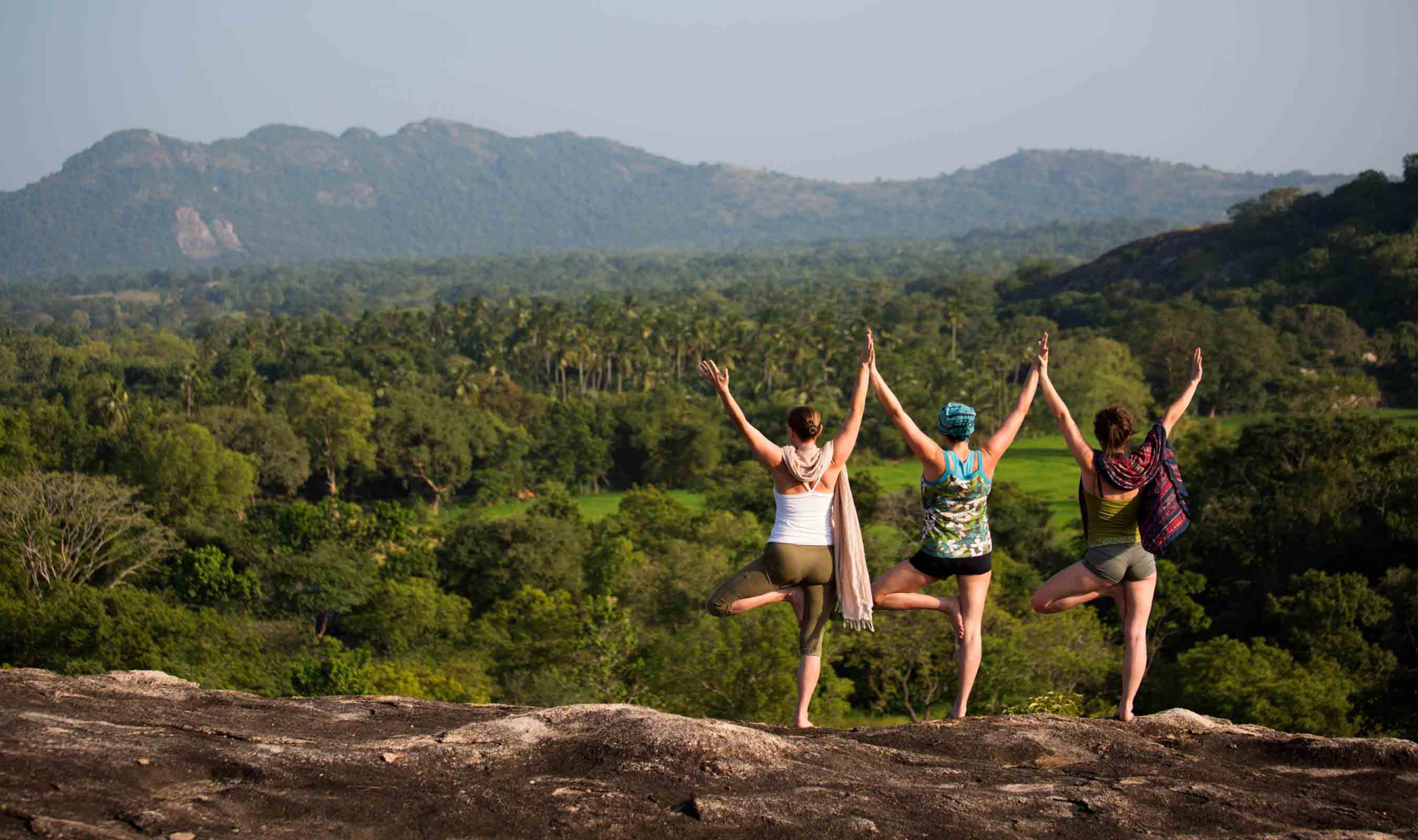It occurred to me, as I gazed out over the beautiful lake at Ulpotha with my brain gradually emptying of the accumulated stresses of living in London, that there would be plenty of people like me who might not get to experience this place, for fear of it being too hard core.
No electricity, phones, internet (!), sleeping in mud huts and all food vegetarian, certainly could paint a picture of stoned hippy Buddhist wannabes, becoming one with nature, with an unwashed hemp shirt regarded the height of luxury.
If you were interested in something different and adventurous, yet relaxing and easy, this misconception might dissuade you from coming.
That would be a tragedy.
So I offered to paint a picture for the potential guests who wanted an amazing experience holiday, but not one that would leave them desperate to run back to their western comforts.
Ulpotha is an experience that can never really be described, though Moyra Bremner has done a very good job in her article to convey the essence of the place.
My story aims to address some of the practical questions you might have from the perspective of an independent, non-yogi type guest.
In summary, if a 5 star beach resort with evening gin and tonics and home-from-home luxuries is your preferred destination, or if you like extreme hardship and want to eat bugs for breakfast, then Ulpotha isn’t for you from either perspective – and you probably wouldn’t fit in anyway.
But if you genuinely want to get away from it all, in a warm, engaging and totally relaxing environment, but with a more minimalist lifestyle, where you can challenge your perception of just how important a hairdryer is, then you will have the most amazing time. Just don’t unnecessarily worry about the things below….
The General Setup
It’s a bit hard to imagine, but Ulpotha is a sort of resort in a village with a treatment centre (where the Ayurveda happens), scattered wattle and daub huts and a central house acting as the main meeting point, all located on the edge of a beautiful lake. There are 40 villagers who derive their livelihood from tending to guests outside of the times of the year when they are tending to the fields. These locals are wonderful and the interaction with the guests is better than anything you would experience in a hotel.
The site covers a large area and is a network of paths through managed wilderness, connecting discretely located and sensitively designed buildings (huts, shrines, and a yoga shala). There is a huge diversity of flora and fauna and you can quite literally eat from the trees as you walk (if your arms are long enough and you know what you are picking). The lakes (or tanks) are clean, fresh and quite warm, and when calm give some amazing reflections of the surrounding hills. I’m not one prone to exaggerated descriptions, but magical is a pretty accurate term to describe the setting. It is also true that your dreams are more vivid and weird and wonderfully serendipitous things seem to occur while you are there (interestingly, Sri Lanka used be known as Serendib).
Accommodation
Yes, you are sleeping in mud huts, but dried mud is just the plaster veneer to something more substantial. In keeping with the spirit of Ulpotha, they are basic, but give you everything you need, which you’ll soon find is less than you thought.
They are very beautiful and comfortable and are cleaned every day by your personal concierge (one of the villagers). There are a couple of huts that are sort of en-suite, but it really doesn’t make much difference which one you have. There are mosquito nets provided and these are up to the job. Just make sure you don’t fall asleep touching it – the mosis will find that tip of your little finger pressed against the netting.
Food & Water
For someone who gets gastrically ill relatively easily in countries outside Europe, I was a little sceptical about the claim that no one gets food poisoning in Ulpotha. Especially when the water is untreated and available from taps and Sri Lanka is located next to India, famed for holidays spent on the lavatory. But it was true. The water comes from an underground spring and is about as fresh as it gets and is very drinkable. Evian has nothing on Ulpotha tap water. There is no meat, so there is no risk there either. Basically, you’d have to try hard to get ill. Being a dedicated omnivore I was surprised at how well I took to the veggie food. It is genuinely delicious and very varied with a range of spiciness, from the totally mild, to the fairly explosive. It is mostly all grown locally, is cooked fresh every day and is quite distinct from your average Indian fare. It’s also amazing what colours can be achieved without additives!
Your Fellow Guests
I was only there for two weeks, but met a great and varied group of people. Not a hippie in sight. Of course they had a more balanced approach to life than your average London socialite or banker, but everyone was very normal, if a little more spiritual. There was a mix of everyone – from corporate types to therapists in all sorts of medicine that I had never heard of. The nationalities were also nicely mixed on my trip – but then I had a French yoga teacher. And if you “get lucky”, there is the lake hut…..
Ayurveda
This is the Indian therapy which mostly consists of full body massages with copious quantities of oil. It is highly recommended and importantly is one of the few times you’ll get to drink something alcoholic. I went for the one week treatment, which was about right for me. And remember to do what the doctor tells you.
Nature
There’s lots of it about happily but it’s mostly friendly. It’s really quite bizarre to watch the monkeys wandering past the yoga shala, peering in and clearly thinking “What the hell are they doing?!…”. The only thing to avoid is the black ants that give a nasty sting – but even that only last a few seconds, and they are easily spotted. Snakes are there, but we only saw one and you just need to give them the opportunity to get out of the way.
Sanitation
There is one squat toilet if you prefer that style or you could even dig a hole in the ground and use banana leaves as toilet paper, but the standard sanitation is very European and nothing to worry about. There are no flies buzzing around your head reminiscent of the Glastonbury portaloos. There are plenty of toilet blocks for the huts and you rarely if ever have to queue.
Showers are quirky outdoor ones built around a tree or a rock and perfectly up to the job; with a billion gallons of fresh water in the surprisingly warm lake, you won’t be short of somewhere to get clean. Showers are not heated (same temperature as the lake), although if you are desperate for some external warmth, you can use the one in the Ayurveda centre, where you can pour warm water over your head Jungle Book-style. Warm showers will soon drift to the bottom of your priority list, somewhere after deciding whether to have one or two coconut waters.
Health
The only thing to worry about in terms of health, as for any hot & humid country, is stopping sores & scratches becoming infected. So take some antibiotics and antiseptic cream. Malaria isn’t a problem and no one died whilst I was there.
Mosquitoes
It’s the jungle and the birds and bats need to eat something, so there are mosquitoes. Although mosquitoes and I have a mutual, visceral hatred of each other, they really weren’t that much of a problem, certainly not in contrast to the midges of Scotland or places like Thailand etc.. But despite almost bathing in DEET I still got bitten, but that’s me – you might be less of an mosi attractor. The natural remedy of drinking coriander tea seemed to work and I was definitely less of a food source after a week. I was also unlucky that it rained in the dry season, so there were more than usual. But remember, the mosquitoes do seem to understand yoga and will know when you can’t defend yourself – I swear the mosquito knows what an easy picking you are when you are in the candle pose.
The Environment
In two weeks, I saw two pieces of litter, both washed down from the hills. There is basically none in the resort – a refreshing change for a developing country. If you didn’t have to use a toothbrush, you could almost forget that plastic had been invented. The founders, Giles and Viren, have gone to a huge amount of effort to develop Ulpotha in keeping with the environment and it was great seeing nature so totally unspoilt, with humans still living there. Even if you don’t want to do the yoga (and its not compulsory), just soaking up the surroundings is enough to make you glad you came.
Yoga
I chose Ashtanga and had Mika as the instructor – a Frenchman who was a very good teacher who took his yoga seriously enough to make it worthwhile, but fun enough to be very enjoyable. I obviously have no idea what the other teachers are like, but each seems to have their own following and some guests time their Ulpotha trip to be with their preferred teacher. So if it really matters to you, you could try out one of their classes back in your home country. But if you get the opportunity to experience a class with Mika, don’t miss out. The yoga experience of the guests varied from non existent to near Brahman, but it there was no yoga militancy, nothing is compulsory and all standards are accommodated and accepted.
Other Exercise
If yoga isn’t enough, you can swim and canoe in the lake and go cycling to the local villages. All of which should get your heart rate up. Running is a bit of a non starter, so don’t bother taking any running shoes.
Daily Routine
The days drift by remarkably quickly. A typical routine might be 0700 – morning swim in the lake. 0730 – rehydrate with a fresh coconut juice and very light breakfast. 0800 – yoga. 0930 – proper breakfast. 1030 – Ayuveda treatment. 1300 – lunch. In the afternoon, you can laze around, reading, swimming or exploring the lake’s “secret garden”. 1700- yoga. 1900 – dinner. 2200 bed. Two weeks will soon seem too short.
Electricity
Yes, life can continue without it. There is one charge point for iPods, etc., which is in high demand, with the organisation of who plugs in being down to the guests – a good test of whether you really could survive in a commune. It’s solar powered so if it isn’t sunny, there won’t be much juice. The place is beautifully lit in the evenings with lamps dotted along the pathways making it look like a very large flame-lit and flickering grotto. But you will need a torch.
Internet & Mobile Phones
The nearest connection to the internet is an hour and a half away. Print out anything you need and email anyone you must before you get there. Mobile phone reception is possible in certain parts of the village, but why would you want it – that’s what you came to escape from, isn’t it?!
Laundry
There is a laundry service that is as free as it is relaxed. When they say it takes four days to get your clothes washed, it genuinely does take that long. “How long does it take to wash a T-shirt”, you ask yourself? But if you are going for more than a week, it does help you minimise on luggage.
The War
This seems to be the major reason for people cancelling trips or not coming to Sri Lanka. A bomb goes off and everyone seems to think they will be the next victim. Seeing as how a tourist has never been killed by the Tamil Tigers, as far as I can determine from a quick search on google, and it is a policy of the Tigers not to target westerners because they get most of their funding in the west, this is all a bit of an over reaction. I found the military presence in Nepal and contact with the Maoists much more worrisome than anything you are likely to experience in Sri Lanka. With most military activity largely isolated in the north, the closest you will get to any military activity is driving through a check point. The chances of a brigade of mountain trained Tamil Tigers descending from the hills to do an amphibious assault across the lake, is about as remote as the place itself. Basically, don’t let the war dissuade you from going.
Security
If you aren’t careful you will get things stolen. Not by people (there is no ebay to resell it on), but by monkeys. Who knows how they learnt to use an ipod, but they have taken a shine to anything shiny. As they can’t buy batteries, I suppose they keep on nicking them when they go flat. So don’t leave them lying around, or you may soon see a macaque nodding its head to your latest tunes.
You don’t need any cash at all (except for the odd day trip), so don’t take much. I spent £2 in 2 weeks and £30 on a day trip. But if you are lucky enough like me to be given 10 times too much by the foreign exchange desk at Heathrow, give it to the main house for safe keeping.
Day Trips
You can organise bespoke day trips further afield, but these are at your discretion and cost. However, there is plenty exploring to be done on a bike or wandering around the local area. Watching the sun rise and sun set from the vantage points on rocks is well recommended. One thing very worthwhile is taking a day trip to the resort owned by the same guys, located on the Indian Ocean. There you get the opportunity to sail on a catamaran, swim in a 125 foot infinity pool and eat the same delicious food as Ulpotha. But, there is also electricity…
What You Absolutely Must Take
You must take a torch – ideally the LED type – with some spare batteries. Mosi repellent, sun cream, antiseptic cream and preferably some antibiotics – just in case. Also useful are spare camera batteries and walking trainers – flip flops are no good on some walks. I am sure there are some essential things that girls have to take, but I wouldn’t wish to pretend I know what they are.
What You Won’t Need
Towels, soap, books – these are all provided and there is an extensive library, covering all sorts of reading material, not just Buddhist teachings.
Daniel Roberts




